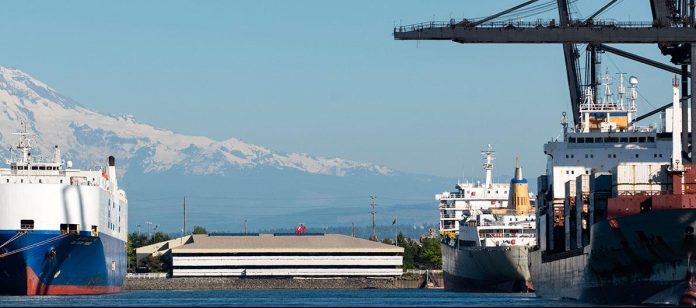Since May, the Port of Tacoma has been using a renewable diesel known as R99—a fuel that can be used in any diesel engine without needing equipment upgrades. The “99” in R99 indicates that the fuel is 99% renewable.
“You just make the choice today, put it in your tank, and you’re on your way to reducing your carbon footprint,” noted Laura Yellig, President and CEO of Petrocard, one of the largest fuel distributors in the Northwest.
Although R99 is produced from materials similar to biodiesel, such as used cooking oil and animal fats, it is manufactured differently. Renewable diesel is refined to be chemically identical to petroleum diesel, allowing it to be mixed at any ratio.
Unlike traditional diesel, renewable diesel has a water-like appearance. More significantly, it burns much cleaner.
“Depending on the fuel source, it can offer a 60 to 75% reduction in lifecycle greenhouse gas emissions and about a 20 to 30% reduction in particulate matter,” explains Rose Arsers, Environmental Project Manager at the Port of Tacoma and The Northwest Seaport Alliance (NWSA).
In 2023, the Port of Tacoma Commissioners committed to achieving net-zero greenhouse gas emissions under the port’s direct control by 2040, moving the target up by a decade.
To meet this goal, Port of Tacoma and NWSA, a partnership between the ports of Tacoma and Seattle, are incorporating electric vehicles and yard trucks, promoting greener short-haul trucks, and expanding shore power at more container terminals.
A June 2024 report revealed a 10% reduction in Puget Sound maritime-related greenhouse gas emissions from 2005 to 2021. While electric solutions for large, specialized equipment are still being developed, renewable diesel is an effective interim solution. Atkinson noted that because R99 burns cleaner, it prevents exhaust filters from clogging, thus lowering the Port’s maintenance costs.
State incentives under the clean fuel standard have increased the availability of renewable diesel, bringing its price closer to that of conventional diesel. According to Petrocard, one of Washington’s five refineries is currently blending renewable diesel, with additional supplies arriving from other states by barge or train.







